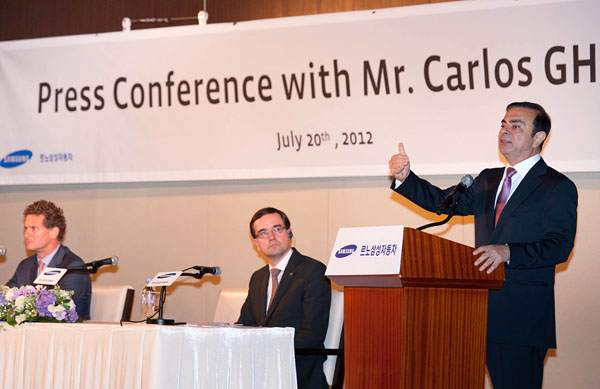The Alliance press release
print
20/07/2012
Renault-Nissan Alliance invests $160 million in Korea to speed global growth strategy
- Alliance will invest US$160 million to add 80,000 units of Nissan Rogue production in Korea and increase cost competitiveness of a key industrial base.
- Renault Samsung Motors will get increased productivity at Busan plant to accelerate its turnaround.
- As Renault Samsung achieves competitive cost targets, Busan plant will produce new derivative vehicles for Korea and export markets.
BUSAN, South Korea (July 20, 2012) – Renault-Nissan Alliance will invest US$160 million in Korea to meet anticipated demand for the next-generation Nissan Rogue and to accelerate growth of Renault Samsung Motors.
Production of Nissan Rogue crossover in Busan, Korea, will begin in 2014, with an annual capacity of about 80,000 units. This year the plant aims to build about 180,000 vehicles for sale in Korea and 60 other countries.
Next-generation Rogue production in Busan gives more momentum to Renault Samsung Motors, which earlier this year launched the “RSM 2012 Revival Plan.” The plan aims to achieve efficiency and cost competitiveness in Busan, while expanding RSM’s vehicle lineup, which today consists of four models.
“Adding production in Korea shows a commitment across the Alliance to helping Renault Samsung Motors achieve its targets for cost competitiveness and growth,” said Renault-Nissan Alliance Chairman and CEO Carlos Ghosn. “The Busan announcement represents a unique ‘win-win-win’ for Renault, Nissan and RSM, demonstrating the flexibility and power of the Alliance for all partners -- and I am counting on every RSM employee to contribute to the successful completion of this project.”

Renault-Nissan Alliance CEO Carlos speaking at press conference in Seoul, Korea, to announce Alliance investment in Busan plant. Far left: Gilles Normand, Renault SVP, Chairman of Asia-Pacific region. Middle: Francois Provost, CEO, Renault Samsung Motors. Credits: Sunmo LEE, BIS STUDIO.
Korea: Key to Renault’s Worldwide Expansion
Formed in 1999, the Renault-Nissan Alliance achieved a record 8.03 million vehicle sales in 2011 in nearly 200 countries. Brands include Renault, Nissan, Infiniti, Dacia and Renault Samsung Motors.
RSM is a key asset for French automaker Renault as it increases its industrial footprint and sales volume outside western Europe, particularly in fast-growing Asia-Pacific markets.
Renault, which is expanding significantly outside of its historic core markets, is expected to sell more than 50 percent of its vehicles outside of Western Europe in 2013, from 43 percent in 2011 and 37 percent in 2010.
Renault aims to achieve a 10 percent market share in Korea, up from 7 percent in 2011.
As part of the “RSM Revival Plan,” RSM will introduce a new small crossover and the zero-emission SM3 ZE in 2013. RSM’s current lineup includes the SM3 compact, the SM5 midsize sedan, the SM7 large sedan (adapted for China as Renault Talisman) and the QM5 SUV, which is sold as the Renault Koleos outside Korea.
Back to Busan: A Homecoming Story for Nissan
Producing the Rogue in Busan represents a unique homecoming for Nissan, which in 1994 helped form Samsung Motors Inc. in cooperation with Korea’s Samsung Group. Nissan and Samsung began construction of the Busan plant in 1995.
In 2000, Renault purchased 70.1 percent of Samsung Motors and created Renault Samsung Motors, becoming the first European carmaker to establish operations in South Korea. Since then, Renault has increased its stake to 80.1 percent of RSM.
Busan has a total capacity of 300,000 vehicles per year. Its vehicles and services have been No. 1 in customer satisfaction for 10 consecutive years.
Renault Samsung Motors has 199 dealerships in Korea, as well as advanced R&D and design facilities in Giheung. The facilities play a significant role in development of Renault’s upper range and SUVs worldwide.
Contact:
*******
Photo: Renault-Nissan Alliance CEO Carlos speaking at press conference in Seoul, Korea, to announce Alliance investment in Busan plant. Credits: Sunmo LEE, BIS STUDIO.




